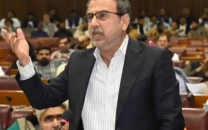Government not responsible for trade, but fully supports private sector: FinMin
Structural reforms in Pakistan’s economy have been welcomed by the IMF chief, said the minister.

Federal Finance Minister Muhammad Aurangzeb has reaffirmed the government's commitment to supporting the private sector, stating that trade is not the government’s responsibility.
Speaking at the Insurance Impact Conference organised by the Securities and Exchange Commission of Pakistan (SECP), he emphasised the need for structural reforms and innovation in the insurance sector.
Aurangzeb highlighted the government's progress in achieving macroeconomic stability over the past 12 months, citing a "positive" meeting with the International Monetary Fund (IMF) chief, who welcomed Pakistan’s structural reforms.
"The details of economic stability are known to everyone, but now we must focus on reforms," he said.
The finance minister stressed that affordable and efficient insurance solutions are essential for creating an "insured Pakistan," adding that the country needs modern approaches to life, health, and general insurance.
"Climate change discussions at this conference are a great step forward because they play a crucial role in shaping the insurance sector," he noted.
He also suggested privatising public-sector insurance firms that continue to operate at a loss. "If state-owned insurance companies are in deficit, they should be handed over to the private sector," Aurangzeb stated.
The minister reiterated that the government’s role is to provide policy frameworks and facilitate businesses rather than engage in trade itself.
"Our focus is to create a conducive environment for the private sector to thrive," he added.
Prime Minister Muhammad Shehbaz Sharif met with Kristalina Georgieva, Managing Director of the International Monetary Fund (IMF) on Tuesday to discuss Pakistan’s ongoing IMF programme and the macroeconomic stability achieved through the government's comprehensive reform agenda.
The meeting took place on the sidelines of the World Governments Summit (WGS) 2025 in Dubai.
According to a statement from the Prime Minister's Office, the discussion focused on Pakistan’s commitment to implementing structural reforms and maintaining fiscal discipline, which have been instrumental in restoring economic stability.
These reforms are seen as crucial for driving sustainable growth in the long term.
Prime Minister Sharif highlighted the progress made under the IMF’s Extended Fund Facility (EFF), which has played a key role in stabilising Pakistan’s economy and setting it on the path of long-term recovery.
He reaffirmed the government’s commitment to sustaining the reform momentum, particularly in areas such as tax reform, energy sector efficiency, and private sector development.
Georgieva commended Pakistan for its effective implementation of the IMF-supported programme, acknowledging the improving economic performance with rising growth and declining inflation.
She recognised Pakistan's recovery and economic growth, emphasising that the country is on a positive trajectory.
The IMF Managing Director also praised Prime Minister Shehbaz Sharif’s leadership and personal commitment to driving the reform agenda, which has been crucial in achieving economic stability.
She reiterated the IMF’s continued support for Pakistan’s reform efforts, emphasising the importance of fiscal discipline, structural reforms, and good governance to ensure long-term economic stability and growth.






















COMMENTS
Comments are moderated and generally will be posted if they are on-topic and not abusive.
For more information, please see our Comments FAQ